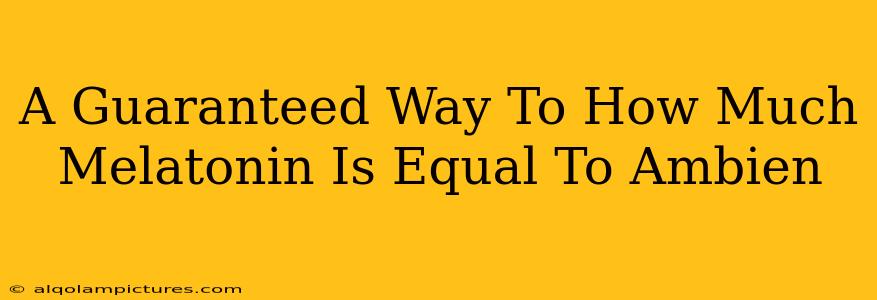It's impossible to give a guaranteed, precise equivalence between melatonin and Ambien (zolpidem). This is because these medications work through entirely different mechanisms and affect individuals differently. There's no direct conversion chart. Attempting to self-calculate a "melatonin equivalent" for Ambien is dangerous and strongly discouraged. Always consult your doctor for any medication changes.
Understanding the Differences: Melatonin vs. Ambien
Before we explore why a direct comparison is flawed, let's understand the fundamental differences between these two sleep aids:
Melatonin: The Natural Hormone
- Mechanism: Melatonin is a hormone naturally produced by your body to regulate sleep-wake cycles. Supplements work by mimicking this natural hormone, helping to adjust your body's internal clock.
- Effects: Generally milder, often causing drowsiness and improving sleep onset. Side effects are typically mild (e.g., headaches, daytime sleepiness).
- Dosage: Varies greatly depending on the individual and reason for use. Always follow product instructions.
Ambien: The Prescription Sedative-Hypnotic
- Mechanism: Ambien is a prescription medication that binds to specific receptors in the brain to induce sleep. It's a much stronger sedative than melatonin.
- Effects: More potent sleep-inducing effects, often leading to deeper sleep and longer sleep duration. However, side effects can be more significant (e.g., daytime drowsiness, dizziness, confusion, dependence).
- Dosage: Strictly controlled by a physician and adjusted based on individual needs and response.
Why Direct Comparison is Impossible and Risky
The key reason you can't directly compare melatonin and Ambien is that they impact the body in fundamentally different ways:
- Different Mechanisms of Action: As mentioned, melatonin works on the body's natural sleep-wake cycle, while Ambien directly affects brain receptors to induce sleep.
- Individual Variation: How your body responds to both substances varies greatly based on factors like age, weight, metabolism, and other medications you're taking.
- Potency Difference: Ambien is far more potent than melatonin. A direct "dosage conversion" could lead to serious adverse effects, such as excessive sleepiness, impaired coordination, and even respiratory issues.
Seeking Safe and Effective Sleep Solutions
If you're struggling with insomnia or other sleep problems, never attempt to self-medicate or calculate dosages based on online information. Here's what you should do:
- Consult a doctor or sleep specialist: They can properly diagnose your sleep issues and recommend the best treatment plan, which may include medication, lifestyle changes, cognitive behavioral therapy for insomnia (CBT-I), or a combination of these approaches.
- Discuss your sleep concerns openly: Your doctor needs a complete picture of your medical history, current medications, and sleep habits to offer informed advice.
- Explore non-pharmaceutical options: Lifestyle changes like regular exercise, a relaxing bedtime routine, maintaining a consistent sleep schedule, and creating a sleep-conducive environment can significantly improve sleep quality.
Disclaimer: This information is for educational purposes only and does not constitute medical advice. Always consult with a qualified healthcare professional before making any decisions related to your health or treatment. Self-treating sleep disorders can be dangerous.

